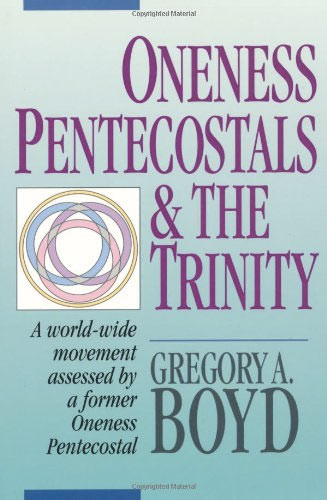Oneness Pentecostals and the Trinity
 Author: Gregory A. Boyd
Author: Gregory A. Boyd
Publisher: Baker (1992)
Topic: Theology: What biblical and theological errors are involved in Oneness (Jesus-Only) Pentecostalism?
Description: While most Pentecostals are orthodox, there is a segment within this movement of “Oneness” or “Jesus-Only” Pentecostals who are not. This movement denies the Trinity, arguing instead that Jesus is himself the Father, Son and Holy Spirit. Many also hold that a person’s sins are not forgiven unless they’re baptized “in Jesus’ name” (not “in the name of the Father, Son and Holy Spirit”). Many also believe that a person cannot be saved unless they “speak in tongues” and that a person must abide by certain strict holiness “standards” to be saved. In Oneness Pentecostals and the Trinity, Dr. Gregory Boyd (who was himself once a Oneness Pentecostal) exposes the biblical errors these people commit in arriving at the non-orthodox views they embrace.
Greg’s story behind the writing of Oneness Pentecostals and the Trinity: In 1974 I surrendered my life to Jesus Christ and had a powerful encounter with God. It happened to be in a Oneness Pentecostal church. We were taught that no one other than Oneness Pentecostals were saved. I of course found this hard to accept, but my powerful experience with God combined with what seemed at the time to be compelling biblical arguments forced me to accept this perspective. Before too long, however, my compulsive reading of theology and my own studying of the Bible led me to reject the doctrines of this church and embrace orthodox trinitarianism.
In the mid-80s I began to get requests from people inside the Oneness camp who were beginning to question some of its teaching and who wanted help working through some of their doctrines. I led occasional Bible studies with these sincere folks, but was disappointed to discover that there was no literature available that critiqued this belief system. So I began to write up short essays presenting my case against various doctrines of the Oneness Pentecostals to use in these Bible studies. These essays eventually involved into the book Oneness Pentecostals and the Trinity.
I have received hundreds of testimonies from people who were empowered to leave the Oneness movement by this book, or who empowered others to leave the movement by giving them this book. This has been a tremendous blessing to me. I pray the book continues to help people caught up in this legalistic system.
As a final note, I should mention that since the writing of this book, there has been a major split among Oneness Pentecostals. Many now reject the notion that only Oneness Pentecostals are saved. Many also reject the necessity of “Jesus’ name” baptism, the idea that one must speak in tongues to be saved as well as the legalism of traditional Oneness Pentecostalism. While my critique of the Oneness view of God would still apply to these groups, the other aspects of my book would not.
